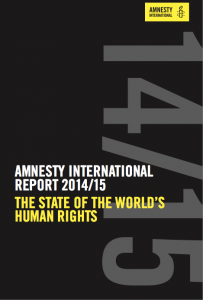 The Amnesty International Report for 2014-2015 details human rights situations in 160 countries and territories including Tibet. This report recounts how the people of Tibet continue to face severe persecution at the hands of China, involving various limitations upon their freedoms of assembly, expression, association, and religious belief. The report additionally points out that many Tibetan writers, protesters, activists, and monastic leaders have been incarcerated.
The Amnesty International Report for 2014-2015 details human rights situations in 160 countries and territories including Tibet. This report recounts how the people of Tibet continue to face severe persecution at the hands of China, involving various limitations upon their freedoms of assembly, expression, association, and religious belief. The report additionally points out that many Tibetan writers, protesters, activists, and monastic leaders have been incarcerated.
“In August 2014, Tibetan demonstrators were reportedly shot by police and security forces in Kardze (in Chinese: Ganzi), Sichuan Province, where a crowd had gathered to protest against the detention of a village leader. At least four demonstrators died from their wounds and one protester committed suicide in detention,” the report said.
The report also told of the circumstances surrounding the increasing numbers of self-immolations that are taking place, and the severe discrimination those related to the self-immolators subsequently face: “Seven people set themselves on fire in Tibetan populated areas in 2014 in protest against repressive policies by the authorities; at least two died as a result. The number of known self-immolations since March 2011 rose to 131. In some counties, family members of self-immolators, or those who have attended the Dalai Lama’s teachings, were sympathetic towards the ‘Dalai Clique’ or had ‘connections overseas’, were barred from senior positions or from standing as candidates in village elections.”
 The International Campaign for Tibet (ICT), a non-profit Tibetan advocacy organisation based in Washington DC, also released a report entitled “Torture and Impunity – 29 Cases of Tibetan Political Prisoners.” This report gives details of the situations of fourteen Tibetans who died after suffering torture while being detained by Chinese authorities, and also sheds light on fifteen other survivors who still face the after effects of horrific ordeals.
The International Campaign for Tibet (ICT), a non-profit Tibetan advocacy organisation based in Washington DC, also released a report entitled “Torture and Impunity – 29 Cases of Tibetan Political Prisoners.” This report gives details of the situations of fourteen Tibetans who died after suffering torture while being detained by Chinese authorities, and also sheds light on fifteen other survivors who still face the after effects of horrific ordeals.
The ICT’s president, Matteo Mecassi, stated, “This report documents that since the unrest and crackdown in 2008, torture appears to have become more widespread and directed at a broader sector of society in Tibet. In particular, a younger generation of Tibetans is paying a high price with their lives for peacefully expressing their views about the oppressive policies implemented by the Chinese Government. Almost any expression of Tibetan identity not directly sanctioned by the state can now be characterised as ‘reactionary’, ‘splittist’, and therefore ‘criminal.’ Democratic Governments and the international community cannot turn their heads away from this systematic abuses and must make China accountable to its international obligations, if a hope to see China reforming is to be seriously pursued.”
The ICT’s “Torture and Impunity—29 Cases of Tibetan Political Prisoners” will be presented at the next meeting of the United Nations Human Rights Council that will take place in Geneva, for the attention of the United Nations Committee against Torture and other UN groups.






 Print
Print Email
Email